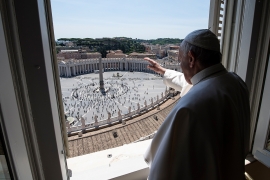"Amid the cacophony of voices and messages that surround us, we need a human story that can speak of ourselves and of the beauty all around us," explains the Pope in the preamble of the message. Today the world is experiencing a huge crisis, due to Covid-19; however, it is also possible to find a united, committed world capable of looking after the poor and the most needy. Fr Gildasio Dos Santo Mendes, General Councilor for Communication, sent a letter to all those responsible for communication in the Salesian Congregation, in which he thanked them for "the courage and creativity to communicate through social networks and various means of communication, the strength of the love and solidarity."
On May 24, Pope Francis recalled the celebration of the 54th World Social Communications Day and invited people to "weave stories". “From childhood we hunger for stories just as we hunger for food. Stories influence our lives, whether in the form of fairy tales, novels, films, songs, news, even if we do not always realize it... By immersing ourselves in stories, we can find reasons to heroically face the challenges of life.” (No. 1).
"Not all stories are good stories" because we are full of stories that "serve to lull us, convincing us that to be happy we continually need to gain, possess and consume. We may not even realize how greedy we have become for chatter and gossip, or how much violence and falsehood we are consuming." We are therefore encouraged to have the courage to have "patience and discernment to rediscover stories that ... reveal who we truly are." (No. 2).
In this intertwining of stories the Bible is presented to us as "the great love story between God and humanity. At its centre stands Jesus, whose own story brings to fulfilment both God’s love for us and our love for God."
Many of today's marketing men will agree with the Pope, because today's young people communicate, promote themselves by telling "stories". However, the Pope explains: "It is not a matter of simply telling stories as such, or of advertising ourselves, but rather of remembering who and what we are in God’s eyes." (No. 5).


